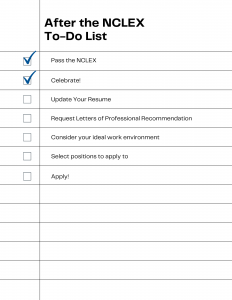Congratulations! You took the NCLEX! What’s next?
NCLEX Series Part III:
You should expect to receive your official results in the mail within 6 weeks. If your nursing regulatory body (NRB) uses Quick Results Services, you’re in luck! For less than $10 you can avoid 6 weeks of wondering and get your unofficial score in about two days. Find out whether you are a Quick Results Candidate on NCSBN Quick Results. All NCLEX tests are scored and processed twice to ensure you get accurate results. Therefore, if your results don’t arrive within 6 weeks, be sure to contact your Nursing Regulatory Body. If you haven’t already, read “NCLEX Series Part I: What is the NCLEX?” and “NCLEX Series Part II: Preparing for the NCLEX” to get caught up on this important conversation.
You Passed the NCLEX.

As you celebrate, you’ll be planning out your next steps. Once your NCLEX scores are official and published by your state’s Board of Nursing, you can legally begin work.
To set yourself up for success, enter the hiring market with an up-to-date resume and a few good letters of professional recommendation. First, update your resume to reflect your nursing school degree and any other professional experience you have acquired. Additionally, if you are looking for a great resume-building resource, check out this. “Step-by-Step Guide to Making the Perfect Resume.” Hirers are looking for information that indicates you will be a successful, reliable nurse. So, how can you communicate that to them? Start by requesting a letter of professional recommendation from authority figures you worked closely with within a healthcare setting. For example, this could be a supervisor at a healthcare-related job or one of your nursing instructors. Once you have your application materials prepared, it’s time to decide where to apply.

Some nurses are interested in specialties, like MED-SURG, and are able to apply for a position within that specialty and begin right off the bat. If you have preferences in the environment or position you’d like to work in, prioritize applying to those positions. However, don’t be discouraged if your first job as a nurse isn’t in the specialty or environment you had in mind. Instead, keep learning, networking, and climbing up as you gain more experience. Finally, cue the confetti, the cake, and all the celebratory things. Go out into the world and help people the way you’ve dreamed of doing.
You Did Not Pass the NCLEX.
In 2020, about 14% of people failed the NCLEX on their first try. It’s okay to fail. It’s not ideal and it’s not what you wanted, but there is a way forward. Usually when candidates fail the NCLEX they 1) underestimate the challenge of the exam, 2) focus on memorizing instead of understanding the content, 3) experience test anxiety, and/or 4) do not get enough sleep because they try to cram information at the last minute. Take some time to identify why you failed the NCLEX so you can actively work against that self-defeating behavior before your next try.
If you fail the NCLEX, the NRB will send you a Candidate Performance Report (CPR), and this will become your key to passing the test on your next try. Specifically, the CPR is a 2-page report evaluating your performance on the exam. Importantly, it includes an explanation of how CAT works (but you already know that since you read Part I and Part II of this series). Furthermore, the rest of your report will detail your performance in the 8 content areas of the exam. Consequently, you’ll know in which areas you underperformed, which is how you’ll build your next successful NCLEX Study Plan. See a Sample Candidate Performance Report.
Good news! The NCSBN policy allows you to retake the NCLEX 45 days after your failed attempt and you are permitted to take the exam 8 times per year. Learn more about the NCSBN retake policy.
Loved this blog? Don’t want to miss another one? Follow us on Facebook for program information, student motivation, and blog updates.
Resources:
https://www.nursingprocess.org/after-you-failed-nclex.html
https://www.ncsbn.org/public-files/CPR-RN.pdf
https://www.ncsbn.org/exams/after-the-exam/retake-policy.page
https://www.ncsbn.org/exams/after-the-exam/quick-results.page
More on NCLEX

